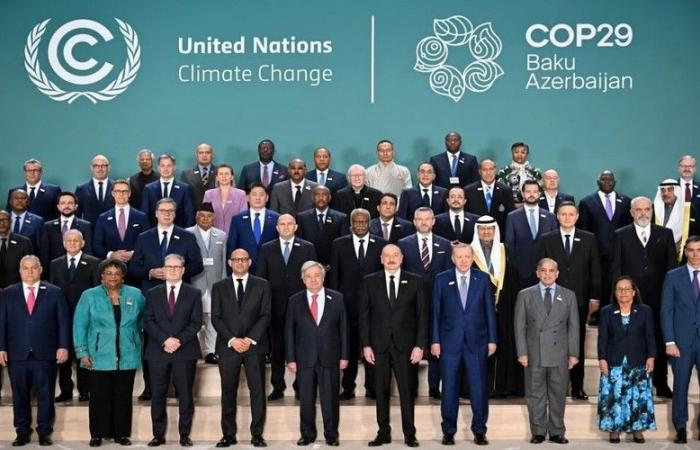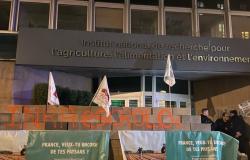The 29th session of the Conference of the Parties (COP29) to the United Nations Framework Convention on Climate Change (UNFCCC), held from 11 to 22 November 2024 in Baku, Azerbaijan, concluded with the adoption of several key decisions. Among the major topics covered are financing targets for the fight against climate change, carbon markets, mitigation mechanisms, as well as loss and damage. This detailed report, issued by the US-based Center for Climate and Energy Solutions (C2ES), provides an overview of the key resolutions made during this crucial session for the future of the planet.
A new climate financing target: $300 billion annually by 2035
One of the key points of this COP29 was the adoption of the new climate finance target (NCQG), aiming to mobilize at least 300 billion US dollars per year by 2035 to support developing countries in their climate change efforts. fight against climate change. This decision marks a turning point in the way developed countries commit to financially supporting the nations most vulnerable to the impacts of climate change.
According to the report, although developed countries have been asked to voluntarily contribute funding, including through South-South cooperation mechanisms, some developing countries, such as India and several African countries, have expressed dissatisfaction with the result. Despite the adoption of the objective, these countries rejected the proposal, considering that the commitments were insufficient given the scale of the challenges to be met.
The “Baku to Belém” roadmap: a plan to increase climate financing
The COP29 Presidency also launched the “Baku to Belém” roadmap, a strategic process towards the COP30 planned for Belém, Brazil. This roadmap aims to increase climate finance for developing countries, with an ambitious target of reaching $1.3 trillion. This financing should include grants and non-debt creating financial instruments. A report on the progress of this process will be presented at COP30.
Carbon markets: a decisive step for the implementation of the Paris Agreement
One of the notable advances of this session was the finalization of guidance on carbon markets, in particular the full implementation of Article 6 of the Paris Agreement. The parties agreed to accounting rules for “cooperative approaches”, establishing a two-tier international registry system, including accounting and transaction functions. In addition, they approved the transfer of credits issued by afforestation and reforestation projects from the Kyoto Protocol to the Paris Agreement mechanism.
Discussions on Article 6.4, relating to the Paris Agreement credit allocation mechanism (PACM), also made it possible to authorize the transfer of credits from afforestation and reforestation projects of the Clean Development Mechanism ( CDM) towards the PACM, respecting the absorption standards adopted at COP29.
Adaptation and the global stocktake: new perspectives on adaptation indicators
COP29 focused on global climate resilience, with discussions on establishing new adaptation indicators. Continued work is planned to refine these indicators to better measure progress in implementing adaptation measures globally. The Baku Roadmap on adaptation was also launched, with particular attention to climate transformation and the inclusion of the gender dimension in adaptation actions.
Just transition and gender: discussions postponed but crucial
The work program on just transition was not adopted at this session and will be reviewed in June 2025. This delay highlights the challenges to ensure that the transition to a green economy is fair and inclusive. Likewise, decisions were taken to extend the gender work program for a period of ten years. This program aims to promote the integration of sex and age-disaggregated data in all climate change initiatives.
The loss and damage fund: a new step for repairs
Another major point was the adoption of the Loss and Damage Response Fund (FRLD) report, which will allow the distribution of funds for losses and damages to begin in 2025. This decision was welcomed by the parties, who stressed the importance of making the FRLD and its Council accountable to the UNFCCC and the Paris Agreement, in order to ensure transparency of financing processes.
Agriculture and food security: progress towards implementing climate action
The issue of agriculture and food security was also the subject of fruitful discussions. The parties welcomed the publication of the Sharm el-Sheikh (Egypt) joint work online portal on climate action in agriculture, and requested the UNFCCC to continue developing this tool to support national climate initiatives. food security and climate resilience.
A step forward for the climate, but challenges remain
COP29 in Baku was marked by significant progress in several crucial areas for the fight against climate change. However, challenges persist, particularly with regard to the financialization of the climate, the just transition, and adaptation to climate change. Discussions will continue in 2025 and beyond, with more ambitious financing and cooperation objectives which must be materialized at the next COPs.
Moctar FICUU / VivAfrik






